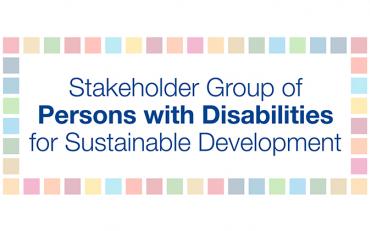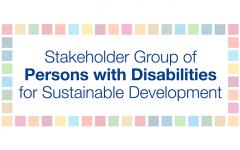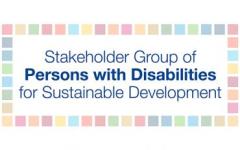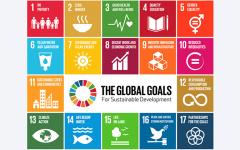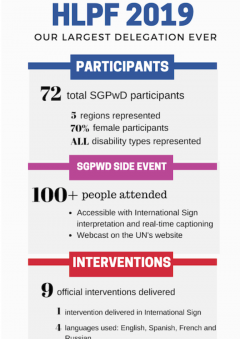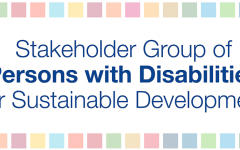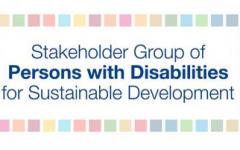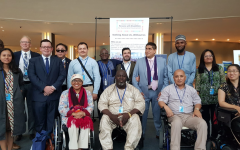December 2017
<< Back to HLPF 2018 main page
Download Word version of this bulletin
General information
The 2018 High-level Political Forum (HLPF) will be held from Monday, 9 July, to Wednesday, 18 July 2018 in New York. The theme is "Transformation towards sustainable and resilient societies." The set of Goals to be reviewed in depth will be: Goals 6, 7, 11, 12, 15 and 17.
In 2018, there will be 48 countries that will report on their progress achieved on implementing the SDGs. These countries include: Albania, Andorra, Armenia, Australia, Bahamas, Bahrain, Benin, Bhutan, Cabo Verde, Canada, Colombia, Dominican Republic, Ecuador, Egypt, Greece, Guinea, Hungary, Iceland, Ireland, Jamaica, Kiribati, Lao People’s Democratic Republic, Latvia, Lebanon, Lithuania, Mali, Malta, Mexico, Namibia, Niger, Paraguay, Poland, Qatar, Republic of the Congo, Romania, Saudi Arabia, Senegal, Singapore, Slovakia, Spain, Sri Lanka, State of Palestine, Sudan, Switzerland, Togo, United Arab Emirates, Uruguay and Vietnam.
In this edition:
I. Global processes
1.1 Global report
1.2 Official submission on behalf of the Stakeholder Group of Persons with Disabilities to the 2018 HLPF
1.3 Financing for Development
1.4 Knowledge exchange on approaches and tools for the VNRs
1.5 The disability Inclusive and Accessible Urban Development
1.6 World Urban Forum
II. Regional section
III. National processes
I. GLOBAL PROCESSES
Global report
We are happy to present you with the CASE STUDY ON THE ENGAGEMENT OF ORGANIZATIONS OF PERSONS WITH DISABILITIES (DPOs) IN VOLUNTARY NATIONAL REVIEWS. This is a comprehensive document on the High-level Political Forum outlining the role of persons with disabilities, created from the Stakeholder Group of Persons with Disabilities to an analysis on DPO participation in Voluntary National Review processes. The report showcases the national-level DPO work carried out in different regions as well as best practices and challenges, and serves as a case study for all. This case study features the volunteering countries of Denmark, Italy, Sweden, Nigeria, Togo, Kenya, Ethiopia, Argentina, El Salvador, Peru, Indonesia, Bangladesh and India.
We are inviting you read and share this substantive report on the engagement of persons with disabilities in Voluntary National Review (VNR) process at the national, regional, and global levels. We hope that this document answers a number of your questions on how to engage in national, regional and global SDG monitoring mechanisms.
We would like to take this opportunity to to thank all the members of the International Disability Alliance and the International Disability and Development Consortium for their support and contributions, as well as others who contributed to this report. The report can be found here.
Official submission on behalf of the Stakeholder Group of Persons with Disabilities to the 2018 HLPF
Annually persons with disabilities are asked to make an official submission to the United Nations addressing the annual theme of the HLPF. For 2018, we expect that the submission will be six pages and due at some point in April. Please note that the UN defines the length and date of the submission. The submission will be published on the UN website and also widely disseminated to Member States and UN Agencies.
INPUT! In line with the 2018 HLPF theme, we are asking for inputs over sustainable and resilient societies and the inclusion and leadership of persons with disabilities; we are calling for any research, papers, and/or information addressing this theme. We will compile all material received and subsequently share an outline for further discussion. You will be able to contribute and share on a continual basis via these bulletins. Please send your inputs with the subject line: Submission 2018 HLPF to Dr. Orsolya Bartha obartha [at] ida-secretariat.org () and Dr. Elizabeth Lockwood elizabeth.lockwood [at] cbm.org
Financing for Development
Civil Society Financing for Development Group’s Strategic Planning Session
The Civil Society Financing for Development Group’s Strategic Planning Session was organized in cooperation with Civil Society Partnership for Development Effectiveness and held in Rome, Italy on December 11-13, 2017. The objective of the meeting was to define a joint strategy and map the steps leading up to the Financing for Development Forum that will take place from 23-26 April, 2018 at the UN in New York. Participants discussed in depth the global fiscal issues from development cooperation, to climate change, debt relief, to new trends in “financialization,” and many other topics. During the discussion all the participants emphasized, that significant work remains to be done to improve fiscal policy to incorporate greater accountability and to embody greater integrity while taking into account human rights and socioeconomic impacts. Click here to read the detailed report of the meeting.
The Inter-Agency Task Force on Financing for Development (IATF)was convened by the UN Secretary-General to follow up on the Addis Ababa Action Agenda and is comprised of over 50 United Nations agencies, programs and offices, regional economic commissions and other relevant international institutions, including the World Bank and the International Monetary Fund. The IATF reports annually on progress in implementing the Addis Agenda and other FfD outcomes and the means of implementation of the 2030 Agenda for Sustainable Development. The IATF report in part influences the FfD Forum outcome document and thus is an important document to influence.
The IATF called for submissions over the 2018 report and contributions were made both by the CSO FfD Group (which includes two references to disability) and a joint policy brief by International Disability Alliance and the International Disability and Development Consortium.
Download the CSO FfD Group submission (with two references to disability).
Download the IDA and IDDC submission.
Knowledge exchange on approaches and tools for the VNRs
The UN Department of Economic and Social Affairs Division organized a two-day meeting between the countries that will be presenting their Voluntary National Reviews (VNRs) at the upcoming 2018 High-level Political Forum. The first one and half days were closed, but on the final day in the afternoon, representatives of the UN system and major groups and other stakeholders were invited to participate. The meeting was held on 5 December at the Palais des Nations in Geneva. During the meeting, stakeholders elaborated on (a) tools and methodologies related to data, including citizen-generated data; (b) participatory approaches and tools for integrating the SDGs and into national plans and strategies; (c) approaches, tools, and methodologies for identifying and analyzing interlinkages between Goals; and (d) examples of mechanisms and arrangements for stakeholder consultation for VNRs.
The International Disability Alliance (IDA) received invitation to attend and present at the meeting. A summary of the presentation to over 50 Member States is as follows. IDA, as an alliance of global networks, has significantly engaged with partners in advocacy in the post-2015 process to achieve the 11 references to persons with disabilities in the 2030 Agenda. IDA has shared knowledge gained from this process and consequently has developed capacity building trainings for organizations of persons with disabilities to engage and conduct national and regional trainings. As a result, in 2017, IDA worked with DPOs in 12 countries globally and compiled a global report, as well as a VNR toolkit for DPOs. IDA highlighted that the most important for persons with disabilities is the engagement with governments at the national level for the implementation of 2030 Agenda.
IDA also led a round table on the topic of leave no one behind and contributed to the short summary of different tools and approaches. You can find the summary of these prepared and widely disseminated by the UN here.
The Disability Inclusive and Accessible Urban Development
The Disability Inclusive and Accessible Urban Development (DIAUD) network emerged out of the need to include the perspectives of the global disability community in the processes leading up and to and during Habitat III the United Nations Conference on Housing and Sustainable Urban Development conference in Quito, Ecuador in October 2016. The involvement of the DIAUD network led to greater inclusion of Persons with Disabilities in the conference’s outcome document – the New Urban Agenda (NUA).
The DIAUD Network was re-ignited in July 2017 to enhance the participation of persons with disabilities and the disability rights community in urban development processes, particularly the 9th World Urban Forum (WUF9) to be held in Kuala Lumpur, Malaysia in February 2018. It will continue in the new year serving as a platform to build and enhance networking between persons with disabilities and other stakeholders from various sectors, including policy, advocacy, urban development, and the private sector, amongst others, with the aim to make disability-inclusive contributions to the implementation of the New Urban Agenda.
The collaboration between the Institute on Disability and Public Policy (IDPP) , the Global Alliance on Accessible Technologies and Environments (GAATES), and World Enabled makes the DIAUD Network possible. These network meetings are hosted and recorded on a virtual platform provided by IDPP. The recordings are available to registered DIAUD Network members and summary blogs of the meetings to date are posted to GAATES’ online news service, Global Accessibility News. Click here to access them. In order to receive updates and further your participation with the DIAUD Network, join the mailing list, go to https://goo.gl/dtxWJf.
World Urban Forum
The Ninth session of the World Urban Forum (WUF9) focuses on the implementation of the New Urban Agenda (NUA), a document adopted at the United Nations Conference on Housing and Sustainable Urban Development (Habitat III) to among other things redress the current lack of environmental accessibility faced by people with disabilities in many cities of the world. Thanks to advocacy by the DIAUD Network the New Urban Agenda includes new commitments related to disability inclusive urban development. During WUF9 the DIAUD member will be active participant in side events, training and networking sessions, to ensure that these commitments are realized through proper urban policy, regulatory norms and standards, "universal design” or “design for all” approaches in planning, mobilization/allocation of sufficient resources, and a broad-based partnership that involves and engages all members of society. The ultimate goal for the DIAUD Network at WUF9 is to enhance the participation of persons with disabilities in the multiple and complex national, regional, and international processes of global governance. Download the concept note of the side event.
II. REGIONAL SECTION
Regional Engagement
Every bulletin will focus on regional engagement of DPOs. It is a space to exchange on our advocacy in the five regions (Asia Pacific, Europe, Latin America, the Arab region and Africa) and to make the link between the national and global levels. It is also an opportunity to update each other on the regional work done around the yearly forums hosted in each region to prepare Member States to the High-level Political Forum.
Please share information on what is taking place for persons with disabilities and the SDGs in your region. Dr Marion Steff from the European Disability Forum will manage the content; please send information to marion.steff [at] edf-feph.org. We will share the information in the next bulletins. Content needs to be sent each month before the 5th of that month.
For more information on what is taking place at the Regional UN Headquarters, click on the following links:
- ECLAC, 18-20 April, Santiago (UN Economic Commission for Latin America and the Caribbean): https://www.cepal.org/?idioma=IN
- ESCAP, 28-30 March, Bangkok (UN Economic and Social Commission for Asia and the Pacific): http://www.unescap.org
- ECE, 1-2 March, Geneva (UN Economic Commission for Europe): http://www.unece.org/info/ece-homepage.html
- ESCWA, 24-26 April, TBC (UN Economic and Social Commission for Western Asia): https://www.unescwa.org
- ECA, TBC (UN Economic Commission for Africa): https://www.uneca.org
EUROPE
New EU-SDGs indicators report is out
EUROSTAT, the European agency working on statistics, published its first monitoring report “Sustainable Development in the European Union - Monitoring report on progress towards the SDGs in an EU context” on 20 November. As a reminder, the European Union (EU) came up with its own set of EU-SDGs indicators comprised of 17 goals and 100 indicators (included 15 indicators on disability).
Not fit for purpose: EU-SDGs monitoring report fails to illustrate how far the EU is from a sustainable future
SDG Watch Europe has released its five-point commentary on the Eurostat report “Sustainable Development in the European Union – Monitoring report on progress towards the SDGs in an EU context”.
Summary
SDG Watch Europe criticizes today’s Eurostat Report on Sustainable Development in the EU for failing to adequately illustrate progress and failure in the implementation of the Sustainable Development Goals (SDGs) across the Union. The report does not address the Agenda 2030’s comprehensive, transformative and universal nature and paints a misleading picture of the EU’s performance on the SDGs:
- The report falls short of addressing all dimensions of sustainable development and focuses on measuring existing solutions rather than capturing what is needed to make the 2030 agenda a reality.
- Key societal, environmental, economic and technological trends are subordinated to the Commission’s current priorities through the choice of indicator and the report paints a skewed picture of the EU’s performance. A striking example: SDG 12 on sustainable consumption and production (SCP) receives one of the highest levels of progress while assessments from the Sustainable Development Solutions Network (SDSN) and the European Environmental Agency (EEA) clearly show that SCP is where high-income countries, including the EU, fail.
- The methodology does not allow for the opportunity to show how far and how fast we need to move in order for the EU to reach the SDGs by 2030: the report does not take into account the level of achievement. Moreover, 1% of change per year already earns a misleading sun symbol even if such slow progress means that the EU will fail to reach the targets by 2030.
- The report does not measure the EU’s impact on sustainable development globally: it is neither able to illustrate whether European efforts in development cooperation are able to reduce poverty and inequality, nor whether the EU is able to reduce its negative impact on the rest of the world due to over-consumption, resource depletion, a large ecological footprint as well as negligence of human rights and exploitation of cheap labour – one of the biggest SDG challenges of the EU.
- The report misses critical data to address the 2030 Agenda principle of leave no one left behind and is weak in measuring how inequalities within the EU are reduced.
SDG Watch Europe demands that:
- The indicator set is revised based on an appropriate and inclusive procedure with adequate civil society contribution.
- The Commission elaborates outlook reports beyond mere monitoring with a broader and qualitative assessment including the participation of civil society and researchers.
- The Commission needs to develop a comprehensive monitoring and assessment system including all dimensions of sustainable development with both the domestic and external dimension.
- The comprehensive assessment should form the base of EU decision making and a real transformation of EU policies and practices.
Two new publications
CONCORD, the European NGO Confederation for Relief and Development has just published two new publications. The first one is called “Monitoring Agenda 2030 implementation across the EU”. It focuses on whether EU institutions and Member States have set up the necessary governance structures to take this holistic agenda forward, whether strategies have been adopted with clear plans for implementation, whether robust monitoring, accountability and review mechanisms have been set up and whether civil society is being engaged and has been building cross-sectoral alliances along the way. From the survey results this paper distils trends, good practices and recommendations for the future.
The second publication is called “The impact of EU policies in the world. Seeing the bigger picture”. In this report, CONCORD examines the impact assessments that accompanied proposals issued by various Directorates-General of the European Commission in 2016, singling out four cases in which there was an adequate, an inadequate or no impact assessment, exploring them in greater depth in an attempt to learn the strengths and weaknesses of the Commission’s current approach and proposing recommendations to adequately analyse the impact on development countries, in order to comply with its Lisbon Treaty obligation and make EU policies more coherent with sustainable development.
ASIA
Global SDG 7 Conference “Ensuring Access to Affordable, Reliable, Sustainable and Modern Energy for All”: A Global Preparatory Meeting in support of the Review of SDG 7 (affordable and clean energy) at the 2018 session of the HLPF will convene from 21-23 February 2018, in Bangkok, Thailand
Recognizing the importance of energy for sustainable development, the United Nations in the 2030 Agenda for Sustainable Development has devoted Sustainable Development Goal 7 (SDG7) to energy, which is inextricably interlinked to other SDGs and related targets, including those relating to poverty eradication, food security, clean water and sanitation, health, education, infrastructure, innovation, job creation, and the empowerment of youth and women. In this context, the HLPF will review SDG7 in July 2018, with a global preparatory meeting in support of the review from 21-23 February 2018 at the United Nations Conference Centre in Bangkok, Thailand. This global preparatory meeting will help facilitate exchange of lessons, insights and experiences among Member States, UN entities and other international organizations and all stakeholders, and consider challenges and opportunities for accelerating progress in the implementation of the 2030 Agenda.
In the official 2016 HLPF submission, persons with disabilities highlighted why energy is of critical importance to them by stating that “Persons with disabilities are also at heightened risk of fuel poverty, whereby having to cut down energy consumption, or to go without completely, to save money. …Ensure universal access to affordable, reliable and efficient energy services for persons with disabilities, including the use of alternative energy facilities where warranted by the local situation, limiting in particular the frequency of power cuts; in line with CRPD Article 28, e.g. access to electricity and/or affordable alternative green sources of energy” (Quote from HLPF 2016 submission).
The registration for the Global SDG 7 Conference is now open to participation from all stakeholders.
- More information about the conference can be found here.
- Register here to attend the Conference (deadline: 15th January 2018)
- Side Event and Exhibits Application(deadline: 31st December 2017)
III. NATIONAL PROCESSES
Vietnam training
From 10 to 15 December, the International Disability Alliance (IDA), CBM International and the Vietnamese Federation on Disabilities, with support from Handicap International, Sightsavers and the Disabilities Rights Advocacy Fund (DRAF), are hosting the Vietnamese Technical Workshop on Reporting the SDG's implementation in light with the CRPD.
More information available on IDA’s website.
Niger training
From 5 to 7 December 2017, leaders from the Niger Federation of organisations of persons with disabilities participated in a technical workshop, held in Geneva, with IDA on the implementation and reporting of the Sustainable Development Goals (SDG) in line with the CRPD. More information available on IDA’s website.
--------
Contact Information
If you have information to share or would like to get in touch with us, please email Dr. Orsolya Bartha obartha [at] ida-secretariat.org, Dr. Elizabeth Lockwood elizabeth.lockwood [at] cbm.org and Megan Smith msmith [at] ida-secretariat.org.
